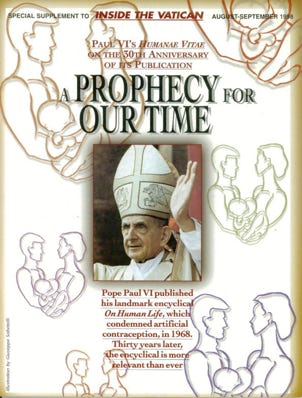
From the 1998 Inside the Vatican
Special Supplement on Humanae Vitae
Note:
While I did not know of this document at the time this Special Supplement was first published, I found out about it when I first met Then-Archbishop Pell at the conference of the Fellowship of Catholic Scholars, September 26, 1998. I told him I certainly would have published it in the Supplement, had I known about it. In fact, I just remembered it again, today, in 2020, and I thought it should be included in this reprise of the Supplement on my Website.
— John Mallon
On Life and Love
catholicculture.org/culture/library/view.cfm by Cardinal George Pell
Description
Pastoral Address by the Archbishop of Melbourne, Australia issued on July 25, 1998 to commemorate the 30th anniversary of Humanae Vitae.
Publisher & Date
Billings Family Life Centre, July 25, 1998
Many Catholics honestly believe that Pope Paul VI in his letter Humanae Vitae of 1968 was wrong to reaffirm the traditional Christian teaching against artificial contraception, common to all Christian churches until early this century. However this may be argued, the Holy Father was right on two scores; on the dignity and beauty of married love and on the dire practical consequences of the contraceptive mentality, of selfishness at work.
The widespread use of the pill unlocked the sexual revolution in Australia and the Western World, which brought an increase in abortions, marriage breakdowns, the number of single mothers and of homeless children. These dark consequences of casual sex are hidden from view, while sexuality itself is constantly debased in films, magazines, and advertising, and young men and women, their relations often troubled by a lurking mistrust, are more reluctant than ever to commit themselves to each other unconditionally for life. Individuals are asking the Church to legitimise homosexual activity, to bless single-sex unions. We have now the tragic AIDS epidemic. In the area of sexuality the signs of the times have validated Paul VIs pessimism about the future and like the true prophets of the Old Testament he was derided and denounced for his predictions.
His letter on human life, Humanae Vitae, published thirty years ago this month, is probably the most famous and least understood encyclical in history. Its publication provoked a whirlwind of dissent, academic and popular, and in the following decades the pill was to become one of the most widely accepted medical developments in human history. Despite our increased scientific knowledge about the side effects of chemicals, despite our greater sensitivity on ecological issues, this is still the situation.
Paul VI promoted responsible parenthood. He taught that couples must decide how many children they should have and how they should be spaced, taking Into account their own physical, economic, psychological and social circumstances, and their duties to God.
themselves, their family and society. But he rejected methods of family planning which involve interventions upon the body or the marriage set, radically separating love-making from life-making.
Paul VI also foresaw that popular pressure and Government authority might be brought to force people into contraception, sterilisation and even abortion, this is very publicly the case in some countries such as China, but even in our own country couples tell me they are constantly urged by friends, family and work circumstances to keep their family size small.
Since 1968, with the encouragement of the Pope's teaching about the sacredness of married love, medical scientists have developed the knowledge (or couples to manage their fertility without the use of harmful drugs, surgery or artificial devices. In the past thirty years, great advances have been made in the area of natural family planning. Sadly, many of our people are unaware of them and still talk dismissively of what are in fact very effective techniques.
The World Health Organisation has demonstrated that couples can easily be taught fertility awareness. This information assists them in seeking help for infertility or to avoid pregnancy. Women are taught to recognise when they are fertile and infertile, and they can then choose when it is appropriate for them to have sexual intercourse. They can predict the onset of ovulation and menstruation, and monitor their fertility and infertility even during irregular cycles, while breast-feeding, after oral contraceptive use. and approaching menopause. Advances in natural methods of family planning have not only helped preserve respect for marital love and for the ecology of the human body they have also empowered women to take a greater role in decisions about their reproductive health, enhancing self-confidence and self-esteem. We owe much to Melbourne doctor: John and Evelyn Billings, whose discoveries in this area have achieved world-wide recognition.
Many Catholics will know of Humanae Vitae only by its reputation as the encyclical which banned Catholics from using contraception. Therefore, it is appropriate to consider Pope Paul's arguments, but it is equally important to examine the neo-pagan alternatives on sexuality, marriage and family which commercial interests are thrusting upon society. Are families better off today? Are more young people happy? Are we content to allow the Sexual Revolution to continue unimpeded, damaging more and more of both young and old? How can we enlist more young Australians in the struggle to defend loving, responsible sexuality? When shall we decide enough is enough?
On the occasion of this anniversary, with the lessons of thirty years of sexual "freedom" now available to us, I urge you to read (or re-read) Humanae Vitae in a spirit of openness. Copies of the encyclical are available free of charge in your parish church, or can be obtained by telephoning my office.
Prayerful reconsideration will not hurt any of us, because doing God's will, whatever the difficulties in identifying it, should be our basic aim.
+George Pell
Archbishop of Melbourne
July 25, 1998
This item 463 digitally provided courtesy of CatholicCulture.org Copyright © 2020 Trinity Communications. All rights reserved.